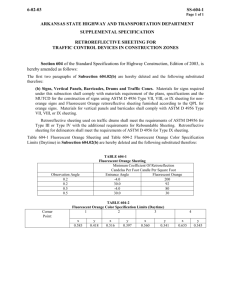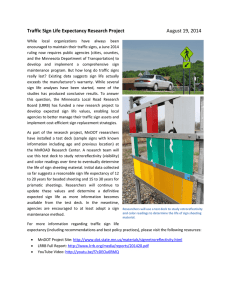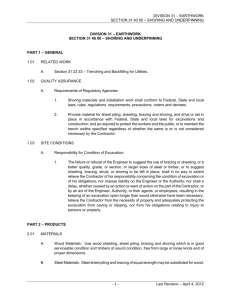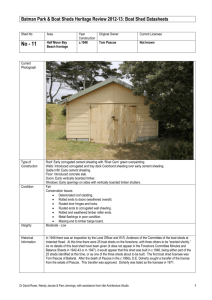3 Diamond Grade™ VIP Reflective Sheeting Visual Impact Performance (VIP) Series 3990
advertisement
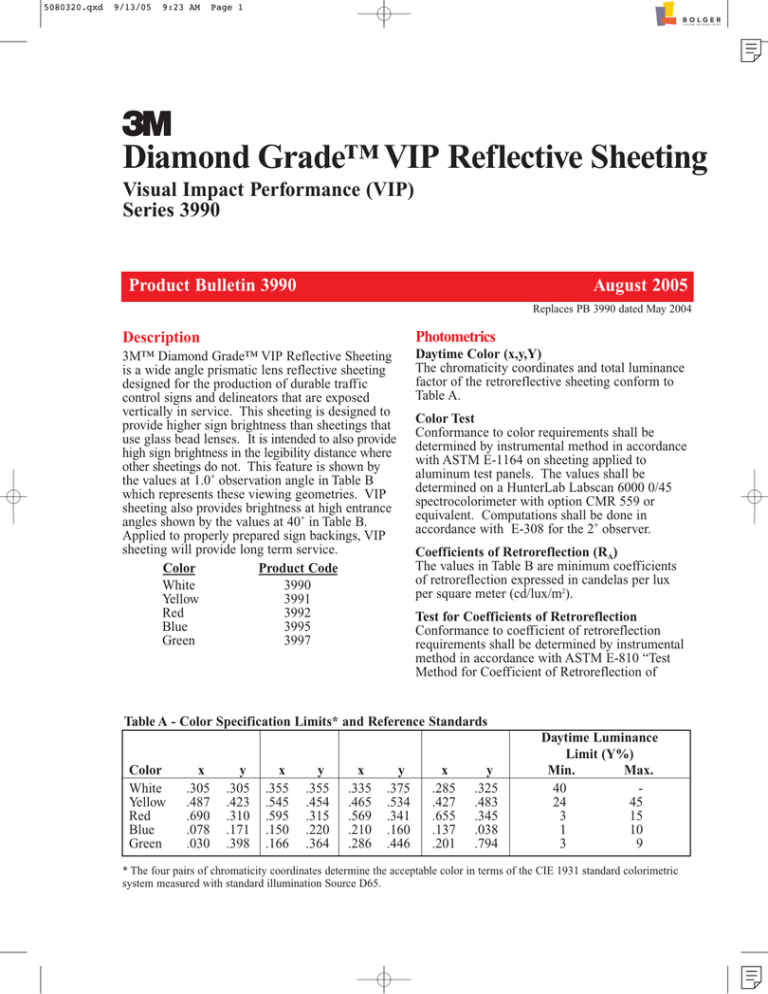
5080320.qxd 9/13/05 9:23 AM Page 1 3 Diamond Grade™ VIP Reflective Sheeting Visual Impact Performance (VIP) Series 3990 Product Bulletin 3990 August 2005 Replaces PB 3990 dated May 2004 Description Photometrics 3M™ Diamond Grade™ VIP Reflective Sheeting is a wide angle prismatic lens reflective sheeting designed for the production of durable traffic control signs and delineators that are exposed vertically in service. This sheeting is designed to provide higher sign brightness than sheetings that use glass bead lenses. It is intended to also provide high sign brightness in the legibility distance where other sheetings do not. This feature is shown by the values at 1.0˚ observation angle in Table B which represents these viewing geometries. VIP sheeting also provides brightness at high entrance angles shown by the values at 40˚ in Table B. Applied to properly prepared sign backings, VIP sheeting will provide long term service. Color Product Code White 3990 Yellow 3991 Red 3992 Blue 3995 Green 3997 Daytime Color (x,y,Y) The chromaticity coordinates and total luminance factor of the retroreflective sheeting conform to Table A. Color Test Conformance to color requirements shall be determined by instrumental method in accordance with ASTM E-1164 on sheeting applied to aluminum test panels. The values shall be determined on a HunterLab Labscan 6000 0/45 spectrocolorimeter with option CMR 559 or equivalent. Computations shall be done in accordance with E-308 for the 2˚ observer. Coefficients of Retroreflection (RA) The values in Table B are minimum coefficients of retroreflection expressed in candelas per lux per square meter (cd/lux/m2). Test for Coefficients of Retroreflection Conformance to coefficient of retroreflection requirements shall be determined by instrumental method in accordance with ASTM E-810 “Test Method for Coefficient of Retroreflection of Table A - Color Specification Limits* and Reference Standards Color White Yellow Red Blue Green x .305 .487 .690 .078 .030 y .305 .423 .310 .171 .398 x .355 .545 .595 .150 .166 y .355 .454 .315 .220 .364 x .335 .465 .569 .210 .286 y .375 .534 .341 .160 .446 x .285 .427 .655 .137 .201 y .325 .483 .345 .038 .794 Daytime Luminance Limit (Y%) Min. Max. 40 24 45 3 15 1 10 3 9 * The four pairs of chromaticity coordinates determine the acceptable color in terms of the CIE 1931 standard colorimetric system measured with standard illumination Source D65. 5080320.qxd 9/13/05 9:23 AM Page 2 Orientation Retroreflective Sheeting” and per E-810 the values of 0˚ and 90˚ rotation are averaged to determine the RA in Table B. 3M™ Diamond Grade™ VIP Reflective Sheeting is designed to be an effective wide angle reflective sheeting regardless of its orientation on the substrate or ultimate orientation after installation. However, because the efficiency of light return from cube corner reflectors is not equal at all rotation angles, it is possible to get the widest entrance angle light return when the sheeting is oriented in a particular way. When extra wide entrance angle performance is important for a given sign type or situation, you may elect to make the signs with a specific orientation. However, unless the location and/or position calls for extra-wide entrance angularity performance signs can be manufactured and installed using the orientation that most efficiently utilizes the reflective sheeting. For purposes of test measurement of the sheeting, it is important for the material to have a datum mark (the orientation arrows) so that the sample can be properly oriented in the test machinery. In those situations where extra wide entrance angle performance is required, this arrow can be used to assure the preferred orientation. NOTE: In cases where letters and numbers are placed on the same sign, it is recommended they be placed with identical orientation. Table B - Minimum Coefficient of Retroreflection RA for new sheeting (cd/lux/m2) -4˚ Entrance Angle2 Observation Angle1 0.2˚ 0.5˚ 1.0˚ White 380 275 80 Yellow 300 220 60 Red 98 70 20 Green 45 32 9.0 Blue 22 17 4.5 30˚ Entrance Angle2 Observation Angle1 0.2˚ 0.5˚ 1.0˚ White 225 135 45 Yellow 180 100 35 Red 65 32 11 Green 28 16 6.0 Blue 14 8.0 3.0 40˚ Entrance Angle2 Observation Angle1 0.2˚ 0.5˚ 1.0˚ White 90 35 10 Yellow 70 27 8.8 Red 26 10 3.0 Green 9.8 3.5 1.6 Blue 4.5 1.5 0.8 Interlocking Diamond Seal Pattern This pattern is unique to 3M wide angle prismatic retroreflective sheetings. Observation (Divergence) Angle - The angle between the illumination axis and the observation axis. 2 Entrance (Incidence) Angle - The angle from the illumination axis to the retroreflector axis. The retroreflector axis is an axis perpendicular to the retroreflective surface. 1 Screenprinted Colors and Overlay Films For screenprinted transparent color areas on white sheeting, or white sheeting covered with 3M™ ElectroCut™ Film Series 1170 when processed according to 3M recommendations, the coefficients of retroreflection shall not be less than 70% the value for corresponding color in Table B. Figure 1 - Sheeting is positioned at a 0° angle. Datum Marks (Arrows) Series 3990 sheeting is made with small arrows in the surface repeated three times across a 36 inch roll and at 12 inch intervals (Figure 2) down the roll. These arrows which point down the length of the roll serve as reference marks for photometric testing. The arrows are also used as visual aids to sheeting orientation when fabricating signs for special high entrance angle situations. The arrow differentiates VIP sheeting from other Diamond Grade sheetings. 2 5080320.qxd 9/13/05 9:23 AM Page 3 Tooling Lines 4. Flexibility Test Method - Following conditioning of 1 x 6 inch sample, remove liner and dust adhesive with talc. At standard conditions, bend in one second around 1/8 inch (3.2mm) mandrel with adhesive side facing mandrel. Requirement - No cracking, peeling or delamination. 5. Gloss Test Method - Test in accordance with ASTM D523 using an 85˚ glossmeter. Requirement - Rating not less than 40. The manufacturing of a prismatic sheeting results in tooling lines being present in the product. In 3M™ Diamond Grade™ VIP Reflective Sheeting, these lines are slightly thicker than the seal pattern legs. Tooling lines are noticeable in shop light but are not observable on the road either in daylight or at night under typical use conditions (Figure 2). T Sign Fabrication Methods Application Diamond Grade VIP sheeting series 3990 incorporates a pressure-sensitive adhesive and should be applied to the sign substrate at room temperature (65˚F/18˚C) or higher by any of the following methods: Mechanical squeeze roll applicator - IF 1.43 Application to extrusions require heat directed at the next-to-last edge roller. Cracking may occur if the top film is not sufficiently softened. Hand squeeze roll applicator - IF 1.6 Across the roll width Figure 2 - Tooling Lines Adhesive Series 3990 sheeting has a pressure-sensitive adhesive that is recommended for room temperature application. Room temperature application is defined as 65˚F (18˚C) or higher. Note - never direct the Calrod™ heater at the sheeting during application. If the heater is needed to warm to the minimum application temperature of 65˚F, direct it at the substrate only. 3 Test Methods of Adhesive and Film Standard Test Panels Unless otherwise specified herein, sheeting shall be applied to test panels in accordance with ASTM D4956 - 01, section 7.2 and test conditions shall conform to ASTM D4956 section 7.1. Hand Application Hand application is recommended for legend and copy only. Application of Diamond Grade sheeting for complete signs or backgrounds must be done with a roll laminator, either mechanical or hand. See Information Folder 1.5 for more details. Hand applications will show some visual irregularities which are objectionable to aesthetically critical customers. These are more noticeable on darker colors. To obtain a close-up uniform appearance, a roll laminator must be used. All direct applied copy and border MUST be cut at all metal joints and squeegeed at the joint. Splices Series 3990 sheeting should be butt spliced when more than one piece of sheeting is used on one piece of substrate. The sheeting pieces should not touch each other at the splice and a gap of up to 1/16 inch is acceptable. This is to prevent buckling as the sheeting expands in extreme temperature and humidity exposure. If the visual appearance of the splice is important or a slight gap is undesirable, the following procedures must be followed: Properties Standard Conditioning - all mounted and unmounted test specimens shall be conditioned for 24 hours at 73˚F + 2˚F (23˚C + 1˚C) and 50% + 4% relative humidity before testing. 1. Adhesive The retroreflective sheeting shall comply with the liner removal and adhesion requirements contained in ASTM D4956 sections 7.10 and 7.5 respectively. 2. Impact Resistance Test Method - Apply sheeting to a standard panel 3 x 6 inch (7.6x15.2cm) and condition. Subject sheeting to a 50 inch pounds (5.7Nm) impact in accordance with ASTM D-2794. Requirement - No separation from panel or cracking outside immediate impact area. 3. Shrinkage The retroreflective sheeting shall comply with the shrinkage requirements contained in ASTM D4956 sections 7.10 and 7.5 respectively. 3 5080320.qxd 9/13/05 9:23 AM Page 4 Cutting and Matching 1. Overlap the sheeting at least one inch, with or without the liner attached. 2. Using a straight edge and a sharp utility knife, cut through both layers of reflective sheeting. 3. Peel back and remove cut remnants. If liner was left on, remove and roll down remaining sheeting. 4. Seal edge with thinned 3M™ 880I Process Color Clear using a fine artist paint brush. Double Faced Signs - Series 3990 sheeting on the first side must be protected from damage from the steel bottom roll of squeeze roll applicators with FR-2 sponge rubber and SCW 568. The sheeting may be hand cut or die cut one sheet at a time, and band sawed or guillotined in stacks. Series 3990 sheeting can be hand cut from either side with a razor blade or other sharp hand tool. Like all reflective sheetings, when two or more pieces are used side by side on a sign, they must be matched to assure uniform day color and night appearance. Cutting equipment such as guillotines and metal shears which have pressure plates on the sheeting when cutting may damage the optics. Padding the pressure plate and easing it down onto the sheets being cut will significantly reduce damage. Maximum stack height for cutting Series 3990 sheeting is 1-1/2 inch or 50 sheets. Details on cutting can be found in Information Folder 1.10. Edge sealing VIP sheeting is generally not required. Following extended exposure, airborne dust particles may become trapped within the row of cut cells along the sheeting edge. This should have no adverse effect on sign performance. If the user chooses to edge seal, series 880I toner should be used. Substrates For traffic sign use, product application is limited to properly prepared aluminum (see Information Folder 1.7). Extrusions are to be wrapped, and flat panel signs are to be carefully trimmed so that sheeting from adjacent panels do not touch on the assembled signs. Users are urged to carefully evaluate all other substrates for adhesion and sign durability. 3M™ Diamond Grade™ VIP Reflective Sheeting is designed primarily for application to flat substrates. Any use that requires a radius of curvature of less than five inches should also be supported by rivets or bolts. Plastic substrates are not recommended where cold shock performance is essential. Sign failures caused by the substrate or improper surface preparation are not the responsibility of 3M. Health and Safety Information Read all health hazard, precautionary and first aid statements found in the Material Safety Data Sheet and/or product label of chemicals prior to handling or use. General Performance Considerations The durability of Diamond Grade VIP Reflective Sheeting Series 3990 will depend upon substrate selection and preparation, compliance with recommended application procedures, geographic area, exposure conditions, and maintenance. Maximum durability of Series 3990 sheeting can be expected in applications subject to vertical exposure on stationary objects when processed and applied to properly prepared aluminum according to 3M recommendations provided in Information Folder 1.7 on Sign Substrate Surface Preparation. The user must determine the suitability of any nonmetallic sign backing for its intended use. Applications to unprimed, excessively rough or non-weather-resistant surfaces, or exposure to severe or unusual conditions can shorten the performance of such applications. Signs in mountainous areas that are covered by snow for prolonged periods may also have reduced durability. Screen Processing Series 3990 sheeting may be screen processed into traffic signs before or after mounting on a sign substrate, using 3M Process Colors Series 880I (see Product Bulletin 880I). Series 880 process colors can be screen processed at 60-100˚F (16-38˚C) at relative humidity of 20-50%. A PE 157 screen mesh with a fill pass is recommended. See Information Folder 1.8 for details. Use of other process colors series is not recommended. 3M assumes no responsibility for failure of sign face legends or backgrounds that have been processed with non-3M process colors or 3M process colors other than those listed above. Care should be taken to avoid flexing Series 3990 sheeting before and especially after screening to eliminate the possibility of cracking from improper handling techniques. 4 5080320.qxd 9/13/05 9:23 AM Page 5 3M process colors, when used according to 3M recommendations, are generally expected to provide performance comparable to colored reflective sheeting, except for certain lighter colors, such as yellow, gold, or heavily toned colors or blends containing yellow or gold, whose durability depends on how much of each color is used. Dilution of color and atmospheric conditions in certain geographic areas may result in reduced durability. 3M™ Scotchcal™ Film 3655 Black, Scotchcal™ film 7720-12, 3M™ Controltac™ Film 180-12 Black, and 3M™ ElectroCut™ Film Series 1170 can be expected to perform satisfactorily for the life of the sign when direct applied to series 3990 sheeting, except where shortened durability is stated in the literature. Avoid banding, crating, or stacking signs. Package for shipment in accordance with commercially accepted standards to prevent movement and chafing. Store sign packages indoors on edges. Panels or finished signs must remain dry during shipment and storage. If packaged signs become wet, unpack immediately and allow signs to dry. See Information Folder 1.11 for instructions on packing for storage and shipment. Cleaning 3M warrants that 3M™ Diamond Grade™ VIP Reflective Sheeting to be sold by 3M to be used as components for traffic control and guidance signs in the United States and Canada will remain effective for its intended use and meet the stated minimum values for coefficient of retroreflection for twelve years, subject to the following provisions in Table C. Installation Nylon washers are recommended between the heads of all twist fasteners (such as screw heads, bolts, or nuts) and the sheeting to protect the sheeting from the twisting action of the bolt heads. Warranty Signs that require cleaning should be flushed with water, then washed with a detergent solution and bristle brush or sponge. Avoid pressure that may damage the sign face. Flush with water following washing. Do not use solvents to clean signs. See Information Folder 1.10. Storage and Packaging Table C – Percentage of Table B Initial RA Minimums Guaranteed Over 12 Year Warranty Period (Colors: white, yellow, red, green and blue) 3M™ Diamond Grade™ VIP Reflective Sheeting should be stored in a cool, dry area, preferably at 65-75˚F (18-24˚C) and 30-50% relative humidity and should be applied within one year of purchase. Rolls should be stored horizontally in the shipping carton. Partially used rolls should be returned to the shipping carton or suspended horizontally from a rod or pipe through the core. Unprocessed sheets should be stored flat. Finished signs and applied blanks should be stored on edge. Screen processed signs must be protected with SCW 568 slipsheet paper. Place the glossy side of the slipsheeting against the sign face and pad the face with closed cell packaging foam. Double faced signs must have the glossy side of the slipsheet against each face of the sign. Unmounted screened faces must be stored flat and interleaved with SCW 568 slipsheet, glossy side against the sign face. Packages of finished sign faces must include sufficient nylon washers for mounting. Warranty Period Minimum Percentage RA Retained 1-7 Years 8-12 Years 80% 70% - RA percentage retained above apply to all entrance and observation angles presented in Table B, and shall be measured per ASTM E 810. - All measurements shall be made after cleaning according to 3M recommendations. If a 3M Diamond Grade VIP sign surface is processed and applied to sign blank materials in accordance with all 3M application and fabrication procedures provided in 3M’s product bulletins, information folders, and technical memos (that will be furnished to the agency upon request), including the exclusive use of 3M matched component systems, process colors, clear coatings, electronic cuttable films, protective overlay films, and recommended applications equipment; and 5 5080320.qxd 9/13/05 9:23 AM Page 6 Limitation of Liability and Remedies If the sign deteriorates due to natural causes to the extent that: 1) the sign is ineffective for its intended purpose when viewed from a moving vehicle under normal day and night driving conditions by a driver with normal vision, or 2) the coefficient of retroreflection after cleaning is less than the minimums specified in Table C, 3M’s sole responsibility and purchaser’s and user’s exclusive remedy shall be: If the failure occurs within the first 7 years from the date of fabrication, 3M will, at its expense, restore the sign surface to its original effectiveness. If the failure occurs within the 8th through the 12th year from the date of fabrication, 3M will furnish the necessary amount of 3M Diamond Grade VIP sheeting to restore the sign surface to its original effectiveness. 3M’s liability under this warranty is limited to replacement or allowance as stated herein, and 3M assumes no liability for incidental or consequential damages such as lost profits, business or revenue in any way related to the product regardless of the legal theory on which the claim is based. THIS WARRANTY IS MADE IN LIEU OF ALL OTHER WARRANTIES, EXPRESS OR IMPLIED, INCLUDING BUT NOT LIMITED TO THE IMPLIED WARRANTIES OF MERCHANTABILITY, OF FITNESS FOR A PARTICULAR PURPOSE, AND ANY IMPLIED WARRANTY ARISING OUT OF A COURSE OF DEALING OR OF PERFORMANCE, CUSTOM OR USAGE OF TRADE. Literature Reference Conditions IF 1.3 IF 1.5 IF 1.6 Instructions for Squeeze Roll Applicator Hand Application Instructions Instructions for Hand Squeeze Roll Applicator IF 1.7 Sign Base Materials IF 1.8 Color Application Instructions IF 1.10 Cutting, Matching, Premasking, and Prespacing Instructions IF 1.11 Storage Maintenance, and Removal Instructions PB 880I 3M™ Process Color Such failure must be solely the result of design or manufacturing defects in the 3M™ Diamond Grade™ VIP Reflective Sheeting and not of outside causes such as: improper fabrication, handling, maintenance or installation; use of process colors, thinners, coatings, or overlay films and sheetings not made by 3M; use of application equipment not recommeded by 3M; failure of sign substrate; exposure to chemicals, abrasion and other mechanical damage from fasteners used to mount the sign; sign burial; collisions, vandalism or malicious mischief. 3M reserves the right to determine the method of replacement. Replacement sheeting will carry the unexpired warranty of the sheeting it replaces. Claims made under this warranty will be honored only if the signs have been dated at the time of sheeting application, which constitutes the start of the warranty period. Claims made under this warranty will be honored only if 3M is notified of a failure within a reasonable time, reasonable information requested by 3M is provided, and 3M is permitted to verify the cause of the failure. ASTM Test Methods are available from ASTM International, West Conshohoken, PA FOR INFORMATION OR ASSISTANCE CALL: 1-800-553-1380 IN CANADA CALL: 1-800-265-1840 Fax-on-Demand in the U.S. and Canada: 1-800-887-3238 Internet: www.3M.com/tss 6 5080320.qxd 9/13/05 9:23 AM Page 7 3M assumes no responsibility for any injury, loss or damage arising out of the use of a product that is not of our manufacture. Where reference is made in literature to a commercially available product, made by another manufacturer, it shall be the user’s responsibility to ascertain the precautionary measures for its use outlined by the manufacturer. Important Notice All statements, technical information and recommendations contained herein are based on tests we believe to be reliable, but the accuracy or completeness thereof is not guaranteed, and the following is made in lieu of all warranties, or conditions express or implied. Seller’s and manufacturer’s only obligation shall be to replace such quantity of the product proved to be defective. Neither seller nor manufacturer shall be liable for any injury, loss or damage, direct, special or consequential, arising out of the use of or the inability to use the product. Before using, user shall determine the suitability of the product for his/her intended use, and user assumes all risk and liability whatsoever in connection therewith. Statements or recommendations not contained herein shall have no force or effect unless in an agreement signed by officers of seller and manufacturer. 3M and Diamond Grade are trademarks of 3M. Used under license in Canada. 3 Traffic Safety Systems Division 3M Center, Building 0225-05-S-08 St. Paul, MN 55144-1000 1-800-553-1380 www.3M.com/tss 3M Canada Company P.O. Box 5757 London, Ontario N6A 4T1 1-800-3MHELPS 3M México, S.A. de C.V. Av. Santa Fe No. 55 Col. Santa Fe, Del. Alvaro Obregón México, D.F. 01210 © 3M, 2005 All Rights Reserved Electronic Only
